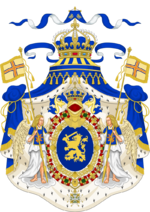Lagerhuis elections, 1680: Difference between revisions
From MicrasWiki
Jump to navigationJump to search
No edit summary |
|||
| Line 1: | Line 1: | ||
{{Batavia Article}} | |||
The '''Lagerhuis elections''' in '''1681''' are scheduled at 20.XV. | |||
==Policies== | ==Policies== | ||
| Line 31: | Line 33: | ||
|- | |- | ||
|Party leader | |Party leader | ||
| | |[[Benjamin Cambernon]] | ||
|[[Alexandra Lucius]] | |[[Alexandra Lucius]] | ||
| | | | ||
| Line 41: | Line 43: | ||
|- | |- | ||
|Interior Affairs | |Interior Affairs | ||
| | |Maintaining the balance of powers, with the lifting of the state of emergency. | ||
|Ceremonial Monarchy, Democracy, Sphere sovereignty and corporatism | |Ceremonial Monarchy, Democracy, Sphere sovereignty and corporatism | ||
|More power in hands of the aristocracy, while keeping the number of voters in check (and limited to certain, wealthier groups). | |More power in hands of the aristocracy, while keeping the number of voters in check (and limited to certain, wealthier groups). | ||
| Line 49: | Line 51: | ||
|- | |- | ||
|Foreign Affairs | |Foreign Affairs | ||
| | |Strengthening the Batavian Confederation, reconquista of Cibola. | ||
|Neutrality, pro international trade | |Neutrality, pro international trade | ||
| | | | ||
| Line 57: | Line 59: | ||
|- | |- | ||
|Economical Affairs | |Economical Affairs | ||
| | |Bexit from the [[Shirerithian Customs Area]], participation in the [[Treaty of Brandenburg]]. | ||
|Corporatism, free trade, Rhineland model | |Corporatism, free trade, Rhineland model | ||
| | | | ||
| Line 65: | Line 67: | ||
|- | |- | ||
|Education and culture | |Education and culture | ||
| | |More development of the Lordship's. | ||
|Modern education with a focus on technological innovation, no forced patriotism | |Modern education with a focus on technological innovation, no forced patriotism | ||
| | | | ||
| Line 73: | Line 75: | ||
|- | |- | ||
|State security | |State security | ||
| | |Creation of the Franco-Batavian military industrial complex. | ||
|Maintaining the status quo of outsourced private military through the Iron Militia, focus on key assets such as the navy and air force for direct state involvement. | |Maintaining the status quo of outsourced private military through the Iron Militia, focus on key assets such as the navy and air force for direct state involvement. | ||
| | | | ||
Revision as of 08:36, 21 January 2020
The Lagerhuis elections in 1681 are scheduled at 20.XV.
Policies
| 1681 elections | Conservative Monarchistische Partij | Voorwaarts Batavië! | Ultraroyalisten | Radicalen | Republikeins Links | Bataafse Arbeiderspartij |
|---|---|---|---|---|---|---|
| Party name in Common tongue | Conservative Monarchist Party | Onward, Batavia! | Ultraroyalists | Radical Party | Republican Left | Batavian Worker's Party |
| Logo | ||||||
| Party leader | Benjamin Cambernon | Alexandra Lucius | Jacques Montrarde | |||
| Political issues | ||||||
| Interior Affairs | Maintaining the balance of powers, with the lifting of the state of emergency. | Ceremonial Monarchy, Democracy, Sphere sovereignty and corporatism | More power in hands of the aristocracy, while keeping the number of voters in check (and limited to certain, wealthier groups). | In favour of centralisation of power in hand of the parliament (Hogerhuis and Lagerhuis) in 's Koningenwaarde. | ||
| Foreign Affairs | Strengthening the Batavian Confederation, reconquista of Cibola. | Neutrality, pro international trade | Attempts at integrating parts of the Batavian Confederation in a stronger, more unified Empire. | |||
| Economical Affairs | Bexit from the Shirerithian Customs Area, participation in the Treaty of Brandenburg. | Corporatism, free trade, Rhineland model | Protectionism. Nationalisation of certain properties. Special attention on rooting out corruption among nobility and higher ups. | |||
| Education and culture | More development of the Lordship's. | Modern education with a focus on technological innovation, no forced patriotism | A Batavian curriculum to promote patriotism and a desire to protect the nation's parliamentarian and royal traditions. | |||
| State security | Creation of the Franco-Batavian military industrial complex. | Maintaining the status quo of outsourced private military through the Iron Militia, focus on key assets such as the navy and air force for direct state involvement. | Increase in funds for the Army and Navy. Introduction of military service. | |||


